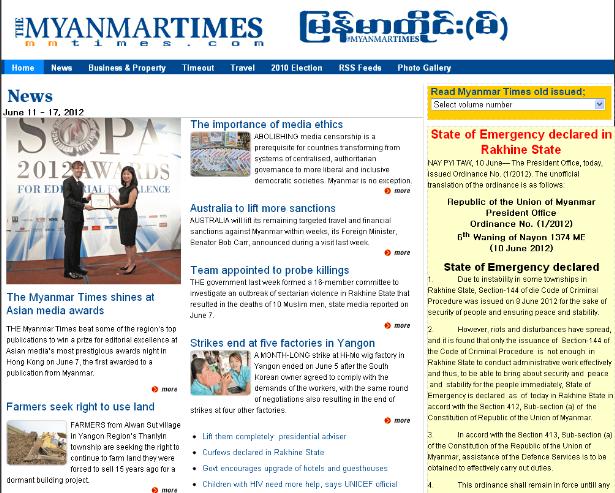Major news in Burma on June 13 : Strikes end at five factories in Yangon
Top news in <The Myanmar Times> : Strikes end at five factories in Yangon

A MONTH-LONG strike at Hi-Mo wig factory in Yangon ended on June 5 after the South Korean owner agreed to comply with the demands of the workers, with the same round of negotiations also resulting in the end of strikes at four other factories.
The negotiations where the breakthrough occurred took place at Kanaung Hall in Hlaing Tharyar Industrial Zone.

The meetings were attended by the owners and workers from Hi-Mo factory, as well as representatives from four other factories where workers were on strike: Costec, Great Forever, CNN Myanmar Trading and San Kaung.
Also in attendance were Deputy Minister of Labour U Myint Thein; U Win Shein from the Factories and General Labour Laws Inspection Department; U Myint Soe, chairman of Myanmar Garment Manufacturers Association; freelance legal consultant U Htay; and U Ko Ko Gyi, an activist with the 88 Generation Students.
During the meeting, Mr Kwak, the South Korean owner of Hi-Mo factory, said he wanted there to be “some understanding” between himself and the workers.
“I want discussions as well. I want our workers to come back to the factory because I want to comply with their demands. The problem was not that big initially. I will listen what they want because I want our workers to understand me,” he said.
The Hi-Mo workers started their strike on May 9. On May 11 they returned to work after coming to an agreement with a representative from the factory.
However, the agreement was revoked by the factory representative, prompting the employees to go back on strike. On May 24, about 1500 women employed by Hi-Mo held a 24-hour vigil in front of the factory.
Although the factory owners had earlier agreed to a list of minor demands by the workers, the main sticking point was a request by workers that the basic monthly salary be increased to K30,000 from K8000.
At the negotiating meeting U Myint Soe proposed the institution of a fixed basic salary system for workers, to which all of the workers agreed except those at Hi-Mo, who held out for a renegotiation of the agreement that had been reached on May 11 but was later cancelled by the factory owners.
According to U Myint Soe’s proposal, trainees will be paid K1000 a day for a monthly basic salary of K27,000. An additional cost-of-living allowance of K100 will be paid, totalling K2700 a month.
In addition, K273 an hour will be paid for overtime, with a maximum of 88 hours a month allowed for overtime (K24,000). A K3000 bonus will also be paid for regular attendance at work. Therefore, the maximum monthly salary for a trainee will be K56,700 a month.
Grade C operators will get K1100 a day (K29,700 a month) for basic salary, K300 a day for cost of living allowance, K300 an hour for overtime and K3000 for regular attendance. With another K3000 productivity bonus, the maximum salary comes to K70,200 a month.
Grade B operators will get K1150 basic salary, K500 a day for cost of living, K5000 for regular attendance, K313 and hour for overtime and a K5000 productivity bonus, for a maximum salary of K82,904.
U Myint Soe said factory owners needed to understand the situation of the workers, but workers also had to understand that the owners faced their own difficulties.
“The first problem is electricity. The owners must run generators, spending money on diesel fuel. And the owners have also had to deal with weak markets since international sanctions were imposed, and they also have to pay expensive transport fees when they export their products,” he said.
In response to complaints by some workers that they had been abused and unfairly punished by management during earlier meetings, Deputy Minister of Labour U Myint Thein told The Myanmar Times that action would be taken in such cases.
“According to the 1951 Factories law, factory owners and managers cannot punish workers in this manner. This is not the way factories should operate according to international standards,” he said.
“Now we know that there are many kinds of problems between workers and owners. If we know about these issues, we can take action to correct them. If someone makes a legitimate complaint, we will take action.”
Ma Mya Hnin Yi, a representative of the striking workers, told The Myanmar Times on June 6 that “everything was fine” as a result of the negations and agreements.
“Everyone in the factory is happy now. The days when we were striking were too long, we had no food or water. Everyone was upset, and many people got sick from sitting in the rain and the direct sunlight. But now everything is alright,” she said.



